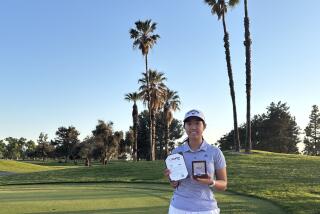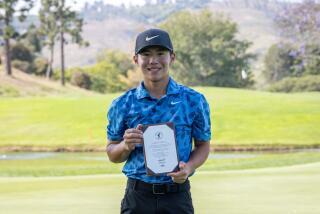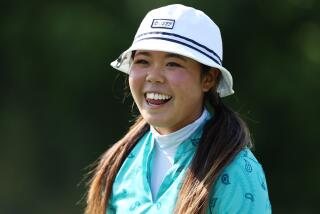GOLF U.S. WOMEN’S AMATEUR : For Koyama, No Match for Luck
- Share via
SAN DIEGO — Greg Norman’s recent success has given hope to Debbi Koyama, a former UCLA golfer from Monrovia.
Like Norman, Koyama has been the victim of some incredible sand shots that have cost her victories.
Norman ended his string of poor luck by winning the British Open. Koyama is hoping to end hers in the 93rd U.S. Women’s Amateur Championship, which starts today at San Diego Country Club in Chula Vista.
She is one of the favorites in the event that begins with medal play today and Tuesday to cut the field from 144 to 64. First-round matches are Wednesday. The next two days, there will be two 18-hole matches each day to winnow the field to two players, who meet in a 36-hole match-play final.
“I haven’t had much success in match play,” said Koyama, 24, who is headed for LPGA qualifying school in two weeks. “Maybe my luck, like Norman’s, will change.”
Koyama has been playing some of the finest golf of her career. She was low amateur qualifier for the U.S. Women’s Open. In the first round of the open at Crooked Stick in Carmel, Ind., she shot a two-under-par 70. She finished in a tie for 26th with a 291.
But in amateur play, she has been something of a victim. In the Trans National at Sannopin Country Club, near Pittsburgh, Koyama played veteran Carol Semple Thompson in the 36-hole final. Koyama went to the 35th hole one down, but she had a six-foot birdie putt and Thompson was in a deep bunker. Thompson holed out and Koyama missed the putt to lose the match. A year ago, in the amateur championship, she played eventual champion Vicki Goetze in the quarterfinal round. At the 17th, Koyama trailed by one hole. She had a four-foot birdie putt and Goetze was in the bunker. Goetze holed out, and Koyama missed her putt and lost the match.
“Those were tough losses,” Koyama said, “but I have matured, especially mentally. I used to think I could play well only on courses that fit my game. Now I feel I can fit my game to any course.
“One of the reasons I’m turning pro is that I think match play is not as fair. You can be two-under and lose a match to someone who is over par. You can make a birdie on a hole, your opponent can triple and she loses only one hole, instead of four shots.
“Another reason is that I won a gold pin at the U.S. Open, but the girls who tied me each won $6,894.”
More to Read
Go beyond the scoreboard
Get the latest on L.A.'s teams in the daily Sports Report newsletter.
You may occasionally receive promotional content from the Los Angeles Times.










